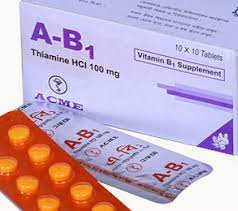

A-B1tab (10 piece)
Reviews & Ratings
Generic
Thiamine Hydrochloride
Indications
Thiamine is used to treat a variety of symptoms linked with thiamine deficiency, including Beriberi and Wernick's encephalopathy, pregnancy-related neuritis, and pellagra. Supplementary Thiamine may be recommended as a preventative measure in cases when dietary intake is insufficient or thiamine absorption is impeded (e.g., due to alcohol) or if requirements are high (pregnancy, carbohydrate rich diet).
Pharmacology
Thiamine, within the shape of thiamine pyrophosphate, is the coenzyme for decarboxylation of α-ketoglutaric corrosive. Thiamine insufficiency influences the fringe apprehensive framework, the gastrointestinal tract, and the cardiovascular framework. This vitamin is essential for the ideal development of infants and children. Thiamine isn't put away within the body, and is regularly lost from tissues amid brief periods of insufficiency. In arrange to preserve ordinary wellbeing, an satisfactory sum of thiamine is required each day. Lack of thiamine leads to weariness, anorexia, gastrointestinal unsettling influence, tachycardia, crabbiness and neurological side effects. Beriberi, a malady due to vitamin B1 insufficiency, is common in heavy drinkers, in pregnant ladies getting an insufficient eat less, and in individuals with malabsorption disorder, drawn out loose bowels and hepatic disease.
Dosage & Administration
Prophylaxis: 3 to 10 mg daily.
Mild chronic deficiency: 10 to 25 mg daily.
Severe deficiency: 200 to 300 mg daily.
Interaction
There have been no reports of dangerous medication interactions. Vitamin B1 interacts synergistically with other B-complex vitamins, lowering the risk of negative effects.
Contraindications
There is no definite contraindication, however repeated parenteral delivery increases the risk of anaphylaxis. Moderate allergy symptoms, such as sneezing or mild asthma, are warning indicators that anaphylactic shock is on the way. To avoid this, it's best to start a second round of injections with a dose that's far lower than the first. Because of the foregoing, vitamin B1 injections should only be administered intravenously to comatose patients. There is no need for parenteral administration or administration of amounts in excess of the daily need once thiamine deficiency has been addressed.
Side Effects
When administered orally, vitamin B1 has no known side effects, but in a few fatal cases, anaphylactic reactions have occurred after intravenous administration of large doses (400 mg) in susceptible patients, particularly youngsters, and in one case, after an intramuscular injection of 125 mg. With repeated parenteral administration of the medicine, the chance of severe responses increases. It's possible that moderate discomfort will develop at the injection site.
Pregnancy & Lactation
The medicine is safe to use in neonates, children, pregnant and lactating women, and the elderly.
Therapeutic Class
Vitamin-B preparations
Storage Conditions
Thiamine injection should be protected from light and moisture.
Pharmaceutical Name
ACME Laboratories Ltd.
Frequently Bought Products
Online Shopping Bangladesh : MShopBD-Majumder Shop
MShopBD-Majumder Shop Online Shopping in Bangladesh is the Best Shopping store within 10000+ products cash on delivery in dhaka, Khulna, ctg & all over Bangladesh with COD-cash on delivery (Only Shipping Cost Advance ) under by www.esdp.gov.bd (bangladesh.gov.bd ) Home Delivery all Over Bangladesh different location and shop as like as Multivendor Online Sites in BD.
Thank you for choosing MShopBD - Majumder Shop!


